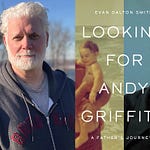Welcome to the third season of The Book I Had to Write!
In today’s episode, I talk with
, author of the memoir The Part That Burns and creator of the newsletter, who describes her writing process, her extraordinary year on Substack, and a unique approach—a blend of craft, wisdom, and kindness—that makes her a beloved teacher of creative writing.Some of my personal takeaways from this episode
She wrote a book that had to be written: Jeannine Ouellette’s memoir, The Part That Burns, is a powerful exploration of her experiences as a younger woman, which include emotional neglect, sexual abuse, and foster care. She says this was really the book she had to write in order to move forward as both a person and writer.
“I’m really interested in this idea of writing around something instead of into it…and how it can hinder our practice…ultimately I had to reckon with the fact that the book demanded to be written if I wanted to become the writer I sought to be,” she says.
She discovered an uncommonly powerful narrator by writing from a child’s perspective: Typically in memoir, we’re encouraged to use a retrospective narrator—that is, one that is both experiencing events but can also stand apart and use the wisdom of years to “explain” what happened.
But Ouellette struggled with how to write her story, she says, until she unlocked a different approach to convey her material—in this case, a child narrator who is still developing and has a limited, or incomplete understanding of the world.
It’s the tension between the child’s limited understanding, and what the writer can convey between the lines, that helps to reel us in.
Nonetheless, in order to pull off any narrator in memoir, Ouellette says the writer must be able to render several selves: the writing self, the narrator, and the protagonist (ie character self).
“There's the writer, that's who we are right now, [the person] on this mission of discovery...And then there's the narrator…the one on the page telling the story. And that is a little bit different from the writer, because the narrator, you only get so many words—maybe 50, 60, 70,000 words—while the writer has all the words, all the thoughts, all the consciousness.”
Her child narrator is effective for other reasons, including for the way Ouellette deploys defamiliarization : Ouellette talks about her use of “defamiliarization,” a technique she borrowed from Russian critic Viktor Shklovsky. In his essay “Art as Device,” Shklovsky describes this device “whereby language is used in such a way that ordinary and familiar objects are made to look different.”
Ouellette believes that defamiliarization is a powerful tool for writers, as it allows them to see the world from a new and curious perspective. Note this it’s not about being overly “writerly” or obscure, but rather about paying closer attention and seeing things in a fresh way.
You can’t avoid the hard stuff forever if you want to become a more integrated person and writer: Writing a memoir that delves into difficult and painful experiences is no easy task. Ouellette acknowledges the challenges she faced in finding the right voice and approach for her book.
She says: "I avoided it most of my life…I had a lot of shame around these experiences." However, she eventually discovered that writing from the perspective of the child narrator allowed her to approach the material in a way that was both honest and artistically powerful.
Ouellette has unlocked a powerful approach to Substack: While Ouellette has only been on the platform since late 2022, she’s become one of the most powerful and original writing teachers on the platform, thanks to several viral essays such as as “Eleven Urgent & Possibly Helpful Things I Learned About Writing from Reading Thousands of Manuscripts,” as well as her writing challenges.
Ouellette “is George Saunders on steroids but also calmer, more focused, and better,” writes author and coach
, who called “Writing in the Dark” one of the “20 Best Creative Writing Substacks.”In the process, Ouellette has deepened her approach to writing and creativity: She talks about the importance of nimbleness, improvisation, and embracing mistakes. She encourages writers to lower the stakes and be open to experimentation, as it can lead to more exciting and authentic work.
Substack has taught her “investment without attachment,” she says in one of her more memorable soundbites.
Ouellette has other great advice for writers: One of her key tips is to pay attention to the balance between internal and external writing. She encourages writers to focus on the exterior details of the world, as they can often carry more weight and evoke a stronger emotional response than internal reflection alone.
She also emphasizes the importance of “aboutness”: She says that writers may not always know what their work is truly about at the beginning, but it is essential to discover and write toward that aboutness. The key here is revision. You write into knowing, trusting that the true essence of your work will reveal itself over time.
Don’t Miss a Single Upcoming Episode
Enjoying this episode? Subscribe to The Book I Had to Write on your favorite platform today!
Discussed on this show/reading suggestions…
Writing Child Narrators: If you’re writing a memoir about childhood and want a thorough discussion of how to approach writing from the child’s perspective, read Jeannine’s essay “That Little Voice: The Outsized Power of a Child Narrator” (Assay: A Journal of Nonfiction Studies)
For another perspective on writing about childhood, check out my essay:
Annie Ernaux/Flat Writing: French Nobel Laureate Annie Ernaux has described her style as “l’écriture plate” or “flat writing”— a voice that is “…flat, but not quite affectless…[striving] for balance between feeling and reporting, writing with almost sociological objectivity,” according to the Paris Review. Read more.
“What Substack Taught Me About Nimbleness, Improvisation, and the Absolute Necessity of Mistakes,” by Jeannine Ouellette, Brevity Magazine, June 22 & 23, 2022. Part 1 | Part 2.
Find Jeannine Ouellette Online
Author website here
The Part that Burns (Split/Lip Books, Moon Palace Books, Bookshop, Amazon, or your favorite independent bookstore!)
Credits
This episode was edited and produced by Chérie Newman at Magpie Audio Productions. Theme music is "The Stone Mansion" by BlueDot Productions.















